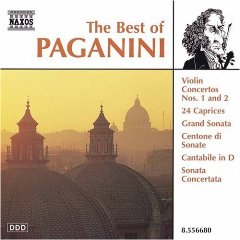The Best of Paganini (1999)
The Best of Paganini (1999)

1. Violin Concerto No. 2 in B minor ("La campanella"), Op. 7, MS 48: Rondo (8:27)
2. Sonata for violin & guitar in D major (Centone di sonate, Letter A/2), MS 112/2: Adagio (8:07)
3. Sonata for violin & guitar in D major (Centone di sonate, Letter A/2), MS 112/2: Rondoncino (4:09)
4. Grand Sonata, for guitar & violin in A major, Op. 35, MS 3: Romanza (9:05)
5. Grand Sonata, for guitar & violin in A major, Op. 35, MS 3: Andantino variato (1:54)
6. Caprice for solo violin in E major (Andante), Op. 1/1, MS 25/1 (2:33)
7. Caprice for solo violin in A minor (Agitato), Op. 1/5, MS 25/5 (2:53)
8. Caprice for solo violin in E major ("The Hunt"), Op. 1/9, MS 25/9 (7:15)
9. Violin Concerto No. 2 in B minor ("La campanella"), Op. 7, MS 48: Adagio (3:33)
10. Sonata concertata, for guitar & violin in A major, Op. 61, MS 2: Adagio assai espressivo (2:05)
11. Sonata concertata, for guitar & violin in A major, Op. 61, MS 2: Rondeau: Allegretto con brio scherz (2:24)
12. Caprice for solo violin in B flat major ("The Devil's Chuckle"), Op. 1/13, MS 25/13 (3:32)
13. Caprice for solo violin in D major (Allegretto), Op. 1/20, MS 25/20 (4:57)
14. Caprice for solo violin in A minor (Theme & Variations), Op. 1/24, MS 25/24 (4:28)
15. Cantabile, for violin & piano (or guitar) in D major, (MS 109) (9:43)
16. Violin Concerto No. 1 in D major, Op. 6, MS 21: III. Rondo: Allegro spiritoso
Performer:
Gerald Garcia [Guitar], Moshe Hammer, Ilya Kaler [Violin],
Norbert Kraft [Guitar], Scott St. John [Violin], Simon Wynberg [Guitar]
Polish Radio Orchestra & Chorus Katowice
Stephen Gunzenhauser – conductor
The remarkable international career of Niccolò Paganini -- regarded in legend as the greatest virtuoso violinist ever -- did not begin until relatively late in life. Born in Genoa in 1782, Paganini received his first musical instruction from his father, a devoted amateur musician. Niccolò's rapid progress on the violin, however, was such that his father (who was in fact a mandolinist, and thus little suited to train his precocious son) was soon compelled to send his son to Giacomo Costa, maestro di capella of the Cathedral at San Lorenzo, for further study. Although he quickly gained some local fame and even embarked on a minor tour of Italy in 1797, it would be many years before Paganini consented to perform outside his native land.
Paganini began composing seriously after his initial tour of Italy in 1797. He performed little during the initial years of the nineteenth century, preferring instead to devote his time to composition and romance (happily combining the two when he met a Florentine noblewoman, to this day anonymous, with a passion for the guitar). In 1805 he resumed his active musical career, accepting the directorship of the orchestra at Lucca, and in 1813 he embarked on a series of concert tours throughout the Italian peninsula.
In 1825, after nearly 30 years of intensive practice and self-scrutiny, Paganini felt he had developed his skills sufficiently to put them on display for all of Europe, and he left Italy for an extensive European tour (Vienna debut 1828, Paris 1831, London 1831). His astounding technical prowess amazed audiences of the day, and many fanciful legends arose to explain his remarkable abilities (one of the more popular held that he was in league with demonic powers, a legend rather supported by his gaunt, pale features). He died in 1840 from cancer of the larynx, having all but ended his concert career in 1834.
Paganini's impact on nineteenth century music cannot be overestimated: he set an entirely new standard of technical virtuosity; he was among the first musicians to champion the music of Berlioz (having commissioned, but never performed, Harold in Italy); and the inspirational effect that his works would have on the young Franz Liszt -- who set out to duplicate Paganini's achievements on the piano -- would alter both the course of music and the life of the young Liszt forever. Paganini's own compositions, including an unidentified number of violin concertos (some six are extant) and numerous chamber works, have more or less been abandoned. The concertos are written in the Italian operatic style of the day, oscillating between lyric charm and ferocious technical display, and are the only works of his which remain in the repertory (though many of the shorter works, by comparison, are gems and deserve to be played more). --- Blair Johnston, Rovi
download: uploaded yandex 4shared mediafire solidfiles mega filecloudio nornar ziddu
Last Updated (Friday, 07 March 2014 21:16)








